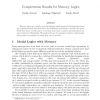Free Online Productivity Tools
i2Speak
i2Symbol
i2OCR
iTex2Img
iWeb2Print
iWeb2Shot
i2Type
iPdf2Split
iPdf2Merge
i2Bopomofo
i2Arabic
i2Style
i2Image
i2PDF
iLatex2Rtf
Sci2ools
159
Voted
LFCS
2009
Springer
2009
Springer
Completeness Results for Memory Logics
Memory logics are a family of modal logics in which standard relational structures are augmented with data structures and additional operations to modify and query these structures. In this paper we present sound and complete axiomatizations for some members of this family. We analyze the use of nominals to achieve completeness, and present one example in which they can be avoided. 1 Modal Logics with Memory Many attempts have been made in recent years to increase modal logic expressivity by adding some notion of state to standard relational structures. This is a natural need, since modal logics are used in many different scenarios as tools for modeling behavior. One example of how this can be achieved comes from epistemic logic with dynamic operators, which allow to express the evolution of knowledge by knowledge-changing actions. Such logics are often called Dynamic Epistemic Logics (DEL) [16], and a large number of DELs has been proposed [9, 13, 14, 15]. These logics differ consi...
Related Content
| Added | 27 May 2010 |
| Updated | 27 May 2010 |
| Type | Conference |
| Year | 2009 |
| Where | LFCS |
| Authors | Carlos Areces, Santiago Figueira, Sergio Mera |
Comments (0)

